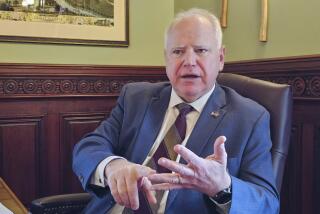Return Dignity to Teaching
- Share via
Few experiences in life really compare with the emotions of the annual return to school classes. Most teachers reach for the phone weeks in advance of any paid work day to confer with their peers about the new school year. Anxious and hopeful, as well as fearful, these secular missionaries are responsible for our nation’s future.
Although I thought that I was prepared to return to school this year, feelings still engulfed me from a highlight of my teaching career, the winning of the United States Academic Decathlon last April. Parents cheered and politicians fawned as John Marshall High, a Los Angeles urban public school, made the highest score ever in decathlon history, besting affluent suburban schools in Pacific Palisades, Palo Alto, Beverly Hills and Texas.
I am still amazed at how much my students and I learned and prospered during the countless hours of studying to win the national decathlon last year. But winning the decathlon was not a surprise to me, my colleagues or students.
The victory was a natural extension of combining a small class, a quality teacher and a purposeful dialogue. The public applauded the results, because this formula for learning seemed so simple. How could anything but success result when this learning process had been around since the time of the ancient Greeks?
Since our school team won the championship last spring, everyone has wanted to know the “secret” to our success. I can only say that the answer was in the process and setting, not in preordained goals.
With large classes, teachers must issue commands to control students, rather than to encourage students’ responsibility and self-reliance. Only in a class with few students can students and teachers talk about issues, hopes and aspirations instead of relying on multiple-choice/true-false exams to assess progress. An authoritarian educational process cannot be our foundation for democracy.
In training for the decathlon, I guided the reading and initiated and provoked discussions for the students, but the visions and the labors were theirs. If I selected readings and questions well, the students found their own passion and purpose to direct their own learning. The students could then discover their own identity and simultaneously value the experience of learning.
Unfortunately, so much bureaucratic scar tissue has grown around our injured educational institution that the true spirit and purpose of learning are often lost. California Supt. of Public Instruction Bill Honig confronts Gov. George Deukmejian; U.S. Education Secretary William J. Bennett and President Reagan castigate teacher-union heads Albert Shanker and Mary Hatwood Futrell; Democrats chide Republicans, and everywhere local school boards or bureaucracies antagonize teachers, which does strengthen unions but does little directly for the educational process.
Today’s proposed reforms usually add more managers and spend less money inside the classroom. Teachers who leave the classroom for better-paying jobs remind those of us left behind that we are losing pay, power, academic freedom and prestige.
How can we motivate teachers to perform well when we continually increase the class-size burden and overemphasize filling out forms?
Most teachers recognize the simplicity of education. Small classes and quality teachers will always produce results. Dignified pay that begins at $40,000 and tops at above $80,000 seems appropriate for that mission. Here in Los Angeles, added study to earn a doctorate still only adds $40 a month to your salary.
We cannot wait for a new superintendent or school board to resolve our schools’ problems, because they are ours. A democratic mass movement, a sort of reverse Proposition 13, must make elected leaders listen and bureaucrats respond to the public. Teachers stimulate the learning, but somehow the superintendents, school boards and bureaucracies receive either more money or more power than those on whom this whole system depends.
We must provide a setting that mirrors Marshall’s winning academic decathlon class: 12 students and a dedicated teacher to direct. We must then pay teachers well, or they, too, will drop out of our schools.
If young, talented teachers quit in their early years of teaching, or if experienced educators lose the inspiration to communicate the trade to a new generation of teachers, we must all re-examine our faith in schools as places to learn and prosper. If it comes to that, we may not wonder why students turn off or drop out, but instead marvel that so many remain in school.
More to Read
Sign up for Essential California
The most important California stories and recommendations in your inbox every morning.
You may occasionally receive promotional content from the Los Angeles Times.













